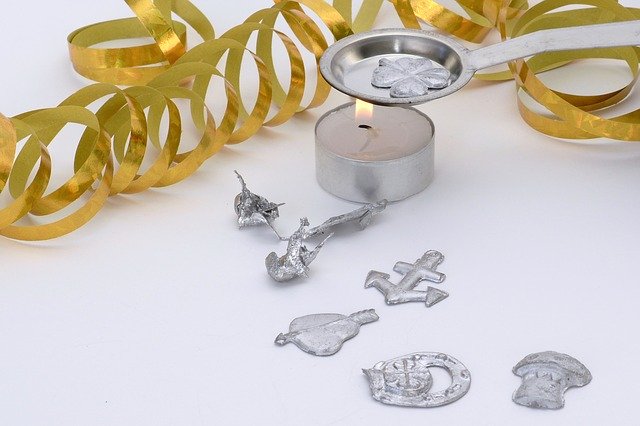
What is New Year's Anxiety?
New Year's Anxiety
Most people really look forward to the end of the year and have never even heard of New Year's Anxiety. With January comes the “right” to turn a new leaf. We can start again. A new year gives us a new start. We celebrate this in grand fashion. Usually with a nice meal, a party with friends on New Year’s Eve, and then the obligatory countdown at midnight.
When I was little, New Year’s Eve was one of the only times we were allowed to stay up late. We celebrated with family and friends. And at midnight, we went outside to shoot off fireworks and watch the whole town explode into colors and shapes in the sky.
New Year’s was a big deal. It was a time to say good-bye to the old. We would all do “Bleigießen”, a German New Year’s tradition. You heat up a lump of lead in a special spoon over a candle. Then you toss the molten lead into a bowl of cold water. You take the shape out of the water and decide on what it looks like.
Sometimes I had a ship, sometimes a feather, or a dolphin. You could look up your shape in a little booklet that comes with the lead kit. It told you what you could expect for the new year. This was such a fun thing to do and I have kept almost all shapes I made along the years.

Fun-filled times with family
Back then, New Year’s was fun. It was filled with anticipation and excitement for what was coming in the next year. We talked about dreams and hopes. We made plans and challenged each other to various resolutions. It was a time away from school and work, just having fun with family and friends. A break in time to relax, decompress, and enjoy.
As time went by, New Year’s started to cause me a lot of anxiety. The pressure to be excited about turning a new leaf became a heavy burden. The strain of failed resolutions added to feeling like a failure every year. I noticed that one year followed the other and nothing changed.
Although I wanted to welcome the next year with enthusiasm, deep down I knew that it would not be any better.
I started off in January hoping that things would get better. I told my parents I would change, be happier, more positive, and the year would be fantastic. By March, I felt the weight of depression on my shoulders and the resolution to “be more positive” faded away. By June, I usually realized that nothing would change, no matter how much I tried.
Hating myself for my failures
I spent the rest of the year frustrated, hating myself, and loathing the fact that I was unable to make a simple change. December came around and I would feel the anxiety mounting. I anticipated the stress of the holidays. I feared having to pretend to be happy and suffer through the holidays with family and friends.
Even more than that I feared New Year’s Eve. The yearly reminder that I had failed yet again. The annual list of things I had not accomplished and proof that the last year had been as bad as the year before. And the fact that I felt like I had to defend my failures to everyone around me. That I had to somehow justify why I could not get my life in order - year after year.
I developed New Year’s Anxiety. The holidays and New Year’s Eve became a source of fear. I tried to avoid the parties and get-togethers. I felt very alone with my failures and misunderstood about what this pressure to change did to me. But, most of all, I hated myself for not being able to do anything about it.
“You are never too old to set another goal or to dream a new dream.”
- C. S. Lewis
How can you start to work through New Year’s Anxiety?
The answer might surprise you because it turned out to be rather simplistic. The thing that helped me most was acceptance. It might sound simple, however, it is one of the most difficult things I have ever done. Accepting myself, accepting my path, and accepting my pace was what finally helped me work through my New Year's Anxiety.
The most difficult thing is to uncover where the path to acceptance starts. For me it started by taking off the pressure of the New Year resolutions and instead following small steps throughout the year to progress. My path was not going to start in January and magically change my life. I walked my journey the entire year, one step forward at a time.

This change in attitude drastically changed my anxiety level. I knew deep inside that it would always be easier to hide from things in my life that needed changing. But, I also knew that this would cause me a lifetime of anxiety and depression. Partially because I would always be running from something. So, I decided to face things head on.
Yes, this caused my anxiety to spike whenever something needed facing and changing. But the truth is that I knew to anticipate these spikes and in the long run it helped me reduce my anxiety level throughout the entire year. Because I was moving forward all the time I knew I did not need to worry about January coming around again and throwing me off balance.

How to prevent New Year's Anxiety
Let’s talk about what kinds of things I do throughout the year to prevent New Year’s Anxiety.
I believe the best steps to take throughout the year are steps that help support you in some small way. Most of my steps, for instance, are small goals that are moving me toward staying (or getting) healthy. Notice the emphasis on “small”. I do not set goals that take a very long time. And “long time” needs to be your own definition. It needs to be what you feel comfortable with.
I find that if I set goals that take months, I usually get bored, distracted, or discouraged.
It brings on the same anxiety that New Year’s does. This is because the change is so overwhelmingly big that I know I can only fail at it. In other words, I break my steps and goals down into very small chunks that I can realistically achieve in a day or a few days. You can apply this method to pretty much anything you would like to achieve or change.
Putting pressure on myself
For example, one of my New Year’s resolutions used to be to lose weight. In January I would go on a strict diet. That would last two weeks. In addition, one of those weeks I would exercise nearly every day. Then, I would get busy with life and work and just revert to what I was doing before. The change was such a drastic difference to my normal routine that it was not realistic in the long run.
Now, I give myself a lot of time to achieve that kind of change. A small step, for instance, would be to commit to cutting out sugar for one day. And then I would commit to it again the next day. After reducing my sugar consumption and feeling like I could handle that for a few weeks, I would start adding the commitment to go for a walk once a week. The steps were small and I felt awesome when I achieved what I had committed to.

Tiny steps to kick New Year's Anxiety
To a lot of people, my changes were too small to make a difference quickly. Going for a walk once a week would not help me lose weight right away. The big difference is that I actually stick with changes like that, whereas if the change is too drastic, I just abandon it and eventually walk away.
And that is a very important point to remember - it is ok to walk away from a goal. If you have set yourself a goal and you realize that you cannot stick with it, it is alright to walk away. This does not mean you have failed at it. It simply means you will need to break this goal down into smaller chunks, so you can succeed by making realistic changes. It is not you that is flawed, it is simply the method of change that is flawed and you need to rethink your approach.

The goals that work best for me are things related to making a positive change in my life. Very often that is difficult to sort out when you are depressed and anxious; however, you can try a few things and see what works for you.

Realistic Goals
Diet and Exercise
These are two areas that really affect everyone. For depressed people making small changes like cutting out sugar, for instance, or going for a walk can already start making a difference. You could also commit to working on a healthy sleep schedule, or hydrating properly throughout the day. You could learn one new recipe on YouTube and cook it for yourself and your family. There are many options with small starting points that could all make a difference in how you feel.

Self-Care
Making positive changes in your diet and exercise are a great start and definitely part of self-care. You can even take this one step further and commit to doing meditation, unplugging for some time each weekend to re-balance, having a bath, getting a massage, listening to music, drawing, taking up things you used to love doing, or simply sitting by the ocean. Whatever feels like it will recharge your batteries and add balance to your life.
Communication
Since it is so easy to get isolated when you are depressed, another area I like to work on is communication. This includes committing to communicating with my family about what is going on and what I need. It might be having a coffee with an old friend in a quiet location. You don’t need to throw a party, but the commitment to connect with others and break through the isolation is essential.

The Takeaway
Accepting myself
New Year’s Anxiety is real and it affects many people I know personally. Over the years I have learned to accept who I am and how I can personally achieve realistic change. This was the key to letting go of this year-end anxiety.
If you experience New Year’s Anxiety, you could be trying to take on too much at a time. You could also be using a model of change that does not work for you. Keep in mind that the point of changing things is to make your life better, not to cause you anxiety and depression.
Having said that, you can walk away from changes that you feel do not benefit you and rethink what it is you really need and want. It is up to you to choose your path and your pace. You are an individual person and your changes will be unique to you.
So, take the time to understand what you would like to change and how you feel comfortable changing it. There is no rule that says you have to change in January. There is also no rule that says you have to change everything cold-turkey and never look back.

Find your own way to change
Change is a journey and you will find there are challenges along the way. You may get set back after moving forward, and you might find that you need to change the method you have picked out.
None of this means you have failed. You are good enough to have the best in life.
Remember that you are strong and usually your “gut feeling” already knows what you need. Follow your intuition and find your own path to change. That way it will be long-lasting and rewarding for you.

I encourage you to let go of the pressure faced at the end of the year and step into the power you hold in your own life.
Go for what you want!
Sources
